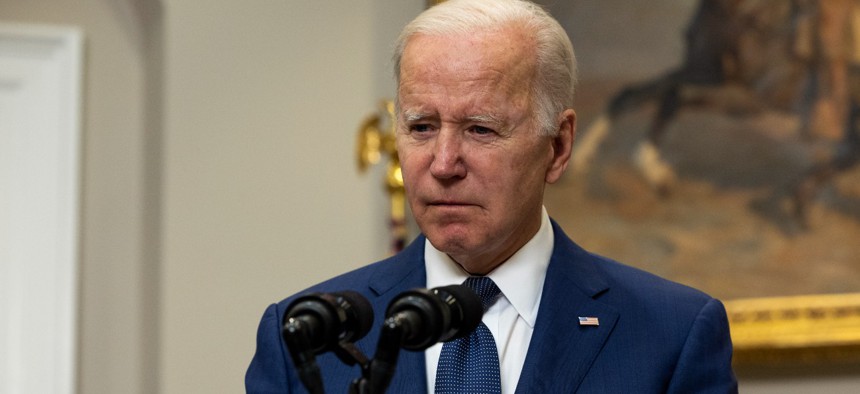
President Biden pauses while delivering remarks from the Roosevelt Room of the White House on the mass shooting at a Texas elementary school on May 24. Biden is set to sign a law enforcement executive order Wednesday. Anna Moneymaker/Getty Images
Biden Orders All Federal Law Enforcement to Wear Body Cameras
Sweeping changes for federal agents and officers win support from their advocates.
All federal law enforcement will soon have to wear body cameras under an executive order President Biden is set to sign on Wednesday, which has won the support of the group representing those personnel.
The order will also require the creation of a database of officer misconduct to which every federal law enforcement agency will contribute and that agencies must then use as part of their screening process for vetting personnel. State and local entities will also be able to use and contribute to the database, which will also include federal officers’ commendations and awards. The Justice Department will maintain the database and make aggregate data available to the public.
Biden will sign the policy, dubbed the Executive Order to Advance Effective, Accountable Policing and Strengthen Public Safety, on the two-year anniversary of the murder of George Floyd by a police officer. Floyd’s death sparked widespread protests of police misconduct, which led to many reforms at the local level but fewer changes for federal personnel. The signing will follow the Justice Department this week updating its use-of-force policy for the first time in 18 years.
The White House drafted the order in close coordination with the Federal Law Enforcement Officers Association, which endorsed the reforms. Larry Cosme, FLEOA’s president, attended around 20 meetings with senior White House staff and called the EO a good compromise. FLEOA and other stakeholders effectively lobbied against some provisions included in a draft version of the order, successfully pushing, for example, to allow officers to review their own footage.
"It's a good step in the right direction," Cosme said. He called the reforms a modernization and said changes like cameras are similar to equipping cars with accessories that were not available 20 years ago. The cameras not only add accountability but protect officers, Cosme added.
Several law enforcement agencies throughout government have piloted body camera initiatives, with the Justice Department requiring them for law enforcement officers engaged in executing search warrants and making pre-planned arrests. The recent omnibus funding package for fiscal 2022 provided agencies with new money to set up or further develop their body camera programs. Under Biden’s new order, federal officers and agents must wear cameras that are activated during activities such as arrests and searches. Agencies must allow for “the expedited public release” of footage in which federal personnel are involved in incidents resulting in bodily harm or death, the White House said.
Similar to the guidelines Justice made public this week, the order will require agencies to promote de-escalation and the mandate that employees intervene when their colleagues are violating use-of-force policies. Biden made all federal law enforcement subject to Justice’s new rules.
Cosme called the use-of-force update important, noting FLEOA has provided its own de-escalation training and pushed the administration to fund such an effort at the agency level. White House officials said such trainings would occur annually for all employees, but Cosme wanted it to occur more frequently. The duty to intervene provision would codify a practice already present in the field, he said.
The order will ban the use of chokeholds by federal personnel and restrict the use of no-knock entries to only occasions when an announcement would “pose an imminent threat of physical violence.” President Trump in 2020 similarly issued an executive order to restrict federal grants to local law enforcement entities unless they instituted policies to limit chokeholds and no-knock entries.
FLEOA pushed the White House to include investments in officer wellness, recruiting and retention, with Cosme noting many agencies have had difficulty in filling positions. Under the order, every federal law enforcement agency will assess and improve its officer wellness programs and the attorney general will recommend measures to prevent officer suicides. Justice and the Health and Human Services Department will release best practices on what those wellness programs should look like. Agencies will also update their recruiting and retention strategies, with a working group identifying new mentorship and leadership opportunities for federal officers. As part of that effort, agencies will also establish new means to ensure they screen new personnel for associations with promoting violence, white supremacy or other bias.
“There has to be an investment in officers and agents,” Cosme said. “The conversations I’ve had with White House leadership and the Justice Department, they realize the current situation and what needs to be corrected.”
Part of that process will be providing the resources for those programs, retention incentives and the training to lay out best practices, which Cosme said the White House has committed to doing. Employees need to know what is expected of them, he explained.
“It’s going to work well,” Cosme predicted. The administration has “been open to implementing the changes we’ve offered.”







